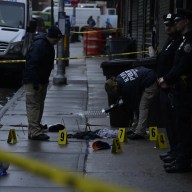By Adam Kramer
Almost 50 years after the first open heart operation, doctors at Long Island Jewish Hospital performed the first non-invasive procedure to fix congenital heart problems.
At the end of March, Dipak Kholwadwala, a pediatric cardiologist at Schneider Children’s Hospital, became the first doctor on Long Island to perform the Amplatzer Septual Occluder Procedure to close holes in the heart of a 40-year-old man and holes in the hearts of two children.
“This new procedure is a major advancement in the management of heart disease in children,” said Dr. Philip Lanzkowsky, chief of staff at Schneider Children’s Hospital in Floral Park. “Before this procedure, every time open heart surgery was performed a patient needed to be hospitalized and suffered a trauma. This is a dramatic improvement in the treatment of congenital heart disease.”
The new treatment for children and adults suffering from an atrial septal defect known as ASD — a small opening in the upper chamber of the heart — closes the hole by using a wire mesh device shaped like a mushroom with two tops.
“The Amplatzer Septual Occluder is a self-expanding device designed to occlude, or close, ASDs,” said Kholwadwala. “The disks and waist are lined with polyester fabric to inhibit blood flow, thus promoting the occlusion or closing. Super-elastic properties allow the device to spring back and regain its shape after being compressed inside a delivery sheath for introduction into the heart via a catheter in the patient’s groin.”
He said the less-invasive procedure is about two hours shorter than open-heart surgery, requires only an overnight hospital stay, means less pain and discomfort, poses a lower risk after the operation and is far less expensive.
“What is truly amazing is that within three to six months heart tissue grows over a significant portion or all of the device,” Kholwadwala said. “This means that the devise literally becomes part of the patient’s own heart.”
Congenital heart defects account for about 10 percent of all heart problems and are usually discovered when a person is 4 or 5 years old. But sometimes a person is asymptomatic and the problem does not show until adulthood.
Some of the symptoms are fatigue, frequent respiratory diseases, heart failure, irregular heart beat, high blood pressure and stroke. It could cause early death.
For 40-year-old Lee Caprarola, of New Jersey, there was never a second thought about having the new procedure as opposed to open-heart surgery to repair the two holes found in his heart. The holes were discovered during a general examination to make sure he was fine after a car accident.
“I have no regrets about doing it,” he said. “I feel fine. Everything has healed up. It was a walk in the park as compared to open-heart surgery.”
The father of two said after doctors discovered he had the holes in his heart they said he needed to have surgery. Nervous about the option of getting cut open, and since he never had any adverse effects from the heart problem, he decided to seek another opinion.
The second doctor confirmed that Caprarola needed to have the holes closed, but suggested a new procedure he had recently heard about and refereed Caprarola to LIJ. He said he met with doctors in August 2001 and then in January they called to say it was a go.
A little more then a month after the surgery, Caprarola said he feels fine and has had not adverse affects from the procedure. He said it is as if nothing had happened, whereas open-heart surgery would have been a major disruption.
“Through this procedure we have replaced one of the most invasive procedures in surgery,” said Frederick Bierman, chief of pediatric cardiology at Schneider Children’s Hospital. “We never anticipated this 50 years ago and it will not take 50 years to get to the next step. The possibilities are limitless.”
Reach reporter Adam Kramer by e-mail at Timesledgr@aol.com or call 229-0300, Ext. 157.
































